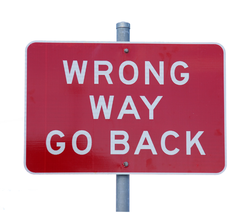
I stepped out of the grocery store and watched a sporty black car zip down the parking aisle the wrong way. I could feel my neck tense in anger and irritation. The nerve of that car. What is wrong with the driver?
Then the black car stopped, paused, and backed into the parking space. My irritation rose.
I continued to my car, stashed my groceries, and headed home, all the while thinking about the situation. Why was I so angry?
The answer that popped into my head: The driver broke the rules.
When I moved from Portland, Oregon to Atlanta in 2002, I signed up with a critique group. I wanted to be a serious writer, a great writer, and I was nervous. I’d never read my work in front of anyone. When my turn came, I made my way through my allotted five pages and waited in silence for the critique to start. One by one the writers remarked on my writing, some positive comments mixed with some negative. All I heard was the negative and when my turn ended and the next writer started to read, I sat there in shock. Numb. I told myself I’m not coming back. No way. And I tuned out everything from that point.
The editor in the group had the most impact on my mental state. She told me it’s wrong to start a sentence with a pronoun (he or she). It’s wrong to start a sentence with a conjunction (but, and, or). Head hopping (writing in the omniscient voice) was wrong. And there were other errors.
The critique group met every two weeks and it took me the entire two weeks to process the fact that people had told me there was something wrong with my writing. I’d thought I was a master artist. I’d thought my writing was perfect. Apparently not. What made me go back to the group was the desire to learn, to master the art of writing, to perfect my style.
Several months later I was browsing titles in a bookstore and thinking about that editor’s criticism. I picked up a book at random and opened to the first page. Every paragraph on the page began with the word "And.” This went on for several pages. I smiled, then I chuckled, then I laughed out loud and thought about the editor. She had an opinion, and she might be right, according to the rules. But the author whose book I held didn’t care. He wrote the way he wanted to. He broke the rules.
Writing, for me, is like playing a game. How can I arrange the words today, this moment? How can I break the rules? Does the writing flow better when I do that? Or would it be better to play it safe?
I break the rules in writing because I savor my freedom of expression. I don’t want to be confined by someone else’s style. It helps me to say what I need to say in my own voice, my own language.
Do you need to speak up about something? Or make a stand? Would breaking the rules help you do that or hold you back? Where do you break the rules, and why?

Nanette is the coauthor of two Easy Weekly Meals electronic cookbooks, editor and coauthor of The 28-Day Thought Diet, and author of the forthcoming book Overcoming Writer’s Block: Moving from Fear to Passion. Her coaching programs offer clients unique and in-depth ways to strengthen their manuscripts and make their writing sing.

 RSS Feed
RSS Feed
